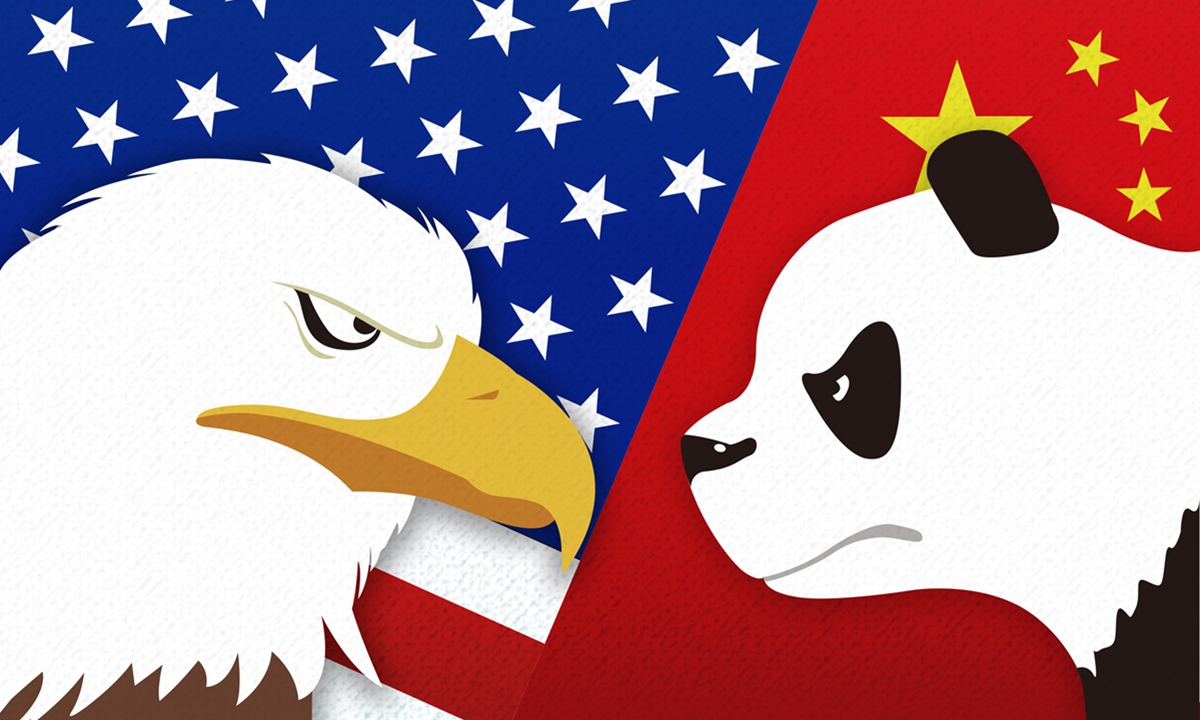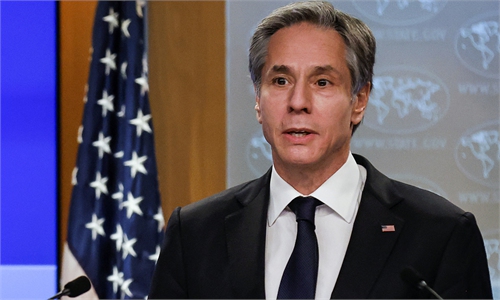
China-US Illustration: Liu Rui/GT
US Secretary of State Antony Blinken delivered his first foreign policy speech on Wednesday, in which he put forward eight most urgent foreign policy priorities. Although he talked about confronting China in the last part of his speech, in this way he was actually emphasizing this point. Blinken claimed that China is the US' "biggest geopolitical test" of the century. He called China "the only country with the economic, diplomatic, military, and technological power to seriously challenge the stable and open international system."
Also on Wednesday, the US released the "Interim National Security Strategic Guidance," describing China in the same tone of Blinken. But neither Blinken's speech nor the interim guidance report has outlined specific policies toward China. Blinken ambiguously said, "Our relationship with China will be competitive when it should be, collaborative when it can be, and adversarial when it must be."
It can be seen that whatever terms the Biden administration has used to define China, it has inherited the Trump administration's thinking on its China policy. But the new administration will not resort to every possible means to deal with China. What the new administration differs from its predecessor is that it has expressed willingness to conditionally collaborate with China and has in public delivered its reluctance to engage in all-out confrontation with China.
The Trump administration was extremely self-confident and arrogant, and its way to interact with China was to blackmail China without any bottom line. The Biden administration has apparently perceived that the Trump way didn't work out well. They are going to try to engage in a systemic game with China, including relying more on allies to strengthen an international siege of China.
Such manner toward China actually releases three messages. First, after the presidential transition, Washington has completed its domestic mobilization to reset China-US relations. Their position seeing China as a "strategic rival" has been consolidated. Second, the Biden administration has realized that it is not realistic to defeat China. The US needs an approach to deal with China, in which the US can maintain its advantage over China in the long run. Third, the current government underlines more on building US power, including solidifying its alliance system.
The room for China to relieve its tensions with the US through talks appears to be very narrow, but the possibility of conflicts between the two countries has also declined. China and the US will get involved in a long-term game in which pressure will be piled on all domains. The one who will make more achievement in terms of strength building will stand in a relatively proactive position to influence the future trend of the bilateral ties.
The Biden administration has adjusted its predecessor's unmannerly attempts trying to crush China, and has reconstructed its tactic on putting pressure on China. This has resulted from China's efforts of withstanding the pressure of the US-launched trade war and boosting its own might. China should devote itself to defining the new round between China and the US by continuing to realize China's expansion in terms of national strengths and frustrating Washington's plan to solidify its allies to counter China.
Despite the new US administration's grand ambitions and big talks, it is not sure about achieving such goals. The mechanism that drives US economic development is outdated and it is difficult to generate any positive energy now. US allies have divergences with Washington over China. The US lacks reasons to demand its allies to counter China with the same strength as it does.
China should continue its reform and opening-up efforts, and push forward its 14th Five-Year Plan (2021-25) as scheduled. China should work with the US to ease tensions, while holding an easy mind in the face of serious disputes. By doing so, China will have a strategically relaxed mind-set and more room to interact. It is easier for China to paralyze the US' China containment strategy than for the US to go against the trend and advance such a strategy.
It is high time that the Chinese people focus on doing their own things well. China's two sessions have begun, an annual occasion when China elaborates its development plans. The US is thinking of how to contain China, while China is thinking of how to develop itself. It is crystal clear whose design is healthier and can be better implemented.

